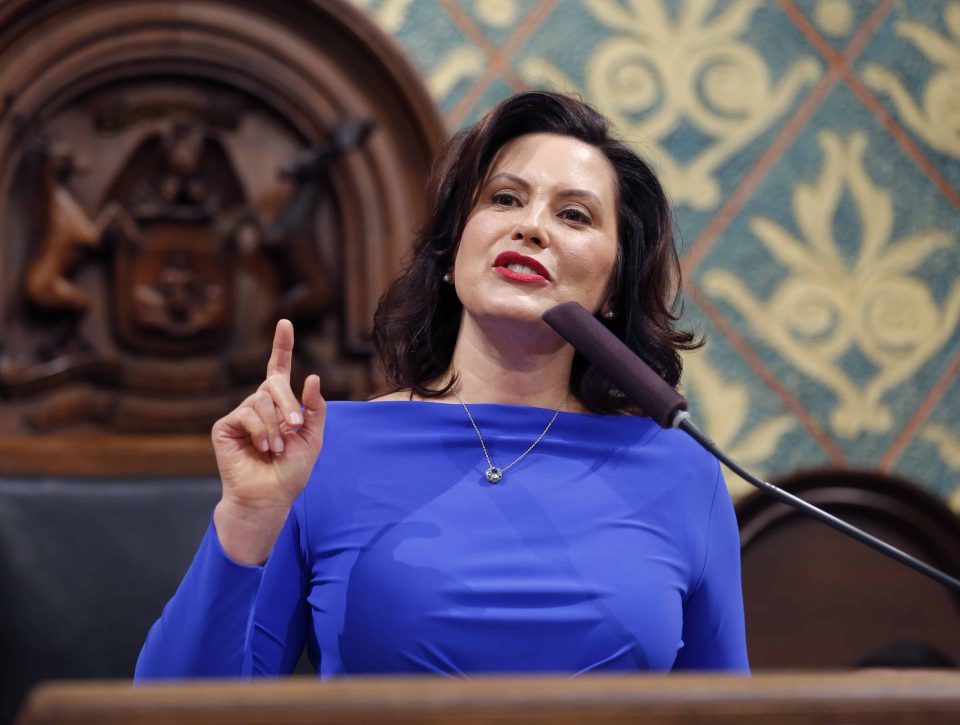LANSING, Mich. (AP) — Democratic Gov. Gretchen Whitmer called Tuesday for nearly tripling Michigan’s per-gallon gasoline tax — and making the state home to the country’s highest fuel taxes — in order to improve aging roads that she warned would only get worse without a major influx of new spending.
The $2.5 billion plan would increase the 26-cent tax by 45 cents by October 2020. To alleviate the burden for some, she proposed a tax overhaul under which retirees and low-income earners would get breaks while more businesses would pay corporate income taxes.
The proposal is an attempt to reverse parts of a tax rewrite enacted by her Republican predecessor, Rick Snyder.
“No one likes to raise taxes,” she told lawmakers during her first budget address as governor. “I wish I didn’t have to come here today and put this budget before you because I know it’s hard. But the hard truth is we got to get to work. Every day we don’t we are jeopardizing our economic future, wasting our money and endangering our people.”
Her road-funding plan is expected to face resistance in the Republican-controlled Legislature, which passed fuel and vehicle registration tax hikes that took effect in 2017 but have been criticized as not generating nearly enough revenue. Critics said the tax hikes only slowed the decline of road conditions.
Whitmer said it would cost the average driver $23 a month, or $276 a year, but contended that motorists already are paying a “roads tax” for vehicle repairs caused by crumbling infrastructure. She proposed doubling the earned income tax credit for low-income residents, saving families at least $30 a month, and repealing the so-called retirement tax on pension and other income — saving 400,000 households $65 per month.
“Fixing the roads means we’re going to bring down the cost the average drivers spends per year on car repairs,” she said. “So the average person in our state will feel relief.”
Michigan now has the 9th highest combined local, state and federal gas taxes in the U.S., according to the American Petroleum Institute. Under Whitmer’s plan, it would have the highest taxes, easily surpassing states like Pennsylvania and California.
Whitmer also outlined a $507 million boost in K-12 spending , including extra funding to teach at-risk, special education, and career and technical students. Another proposal for the current fiscal year includes a $120 million infusion to improve drinking water infrastructure in the state where Flint’s crisis occurred and $60 million to install hydration stations in schools.
Details from Michigan Gov. Gretchen Whitmer’s first budget proposal:
ROADS
She proposed passing a 45-cents-a-gallon gasoline and diesel tax increase that would be phased in between this October and October 2020, raising $2.5 billion more annually for road and bridge work. She wants to no longer divert up to $600 million from general funds to the transportation budget. The new revenue would be targeted to the most heavily traveled and “economically significant” roads rather than be divided under a current formula that critics say favors rural areas.
RETIREMENT TAX
She proposed repealing a 2011 law that eliminated or reduced exemptions from the taxation of pension and other retirement income, saving more than 400,000 families an average of $800 annually.
EARNED INCOME TAX CREDIT
She proposed doubling the earned income tax credit for low-income earners from 6 percent of the federal credit to 12 percent. It would be phased in over two years and benefit 750,000 households. The average credit would increase by more than $150 by 2021.
BUSINESS TAX
She proposed making 150,000 businesses pay the equivalent of a 6 percent income tax instead of the lower 4.25 percent personal income tax. It would raise $280 million per year initially for the state, but the net tax hike would be $105 million because those S corporations, partnerships and limited liability companies could deduct state tax on their federal returns, State Treasurer Rachael Eubanks said.
DRINKING WATER
She proposed spending $120 million to help municipalities and utilities meet tougher lead rules following Flint’s water crisis, combat chemical contaminants known as PFAS, provide drinking water revolving fund loan forgiveness and other steps. Whitmer also proposes spending $60 million to install hydration systems in schools that have lead plumbing and fixtures.
K-12 SCHOOLS
She proposed increasing “operations” funding for K-12 schools by 3.6 percent, the largest in 18 years if non-operating categories are not included such as retirement costs, adult education and borrowing. The minimum per-student allowance — which most districts receive, including charters — would increase from $7,871 to $8,051, a $180 increase. Districts at the higher end would get $8,529, or $120 more than the current $8,409 allotment. Whitmer proposed a new weighted funding system to recognize the higher costs to educate special education, at-risk, and career and technical education students.
LITERACY/PRESCHOOL
She proposed boosting early literacy initiatives, including tripling literacy coaches, and an expansion of the Great Start Readiness Program so more 4-year-olds can attend preschool.
HIGHER EDUCATION
She proposed increasing funding to universities and community colleges by 3 percent. To be eligible, they must hold tuition increases to no more than 3.2 percent. Whitmer also proposed creating the Michigan Reconnect Program to provide tuition-free instruction for adults seeking training, certification or associate’s degrees in specialized careers. It would cost $110 million over two years. Whitmer proposed tapping a fund that former Gov. Rick Snyder and legislators established last year to boost workforce training. Universities would no longer be funded with school aid dollars but instead with general funds.

